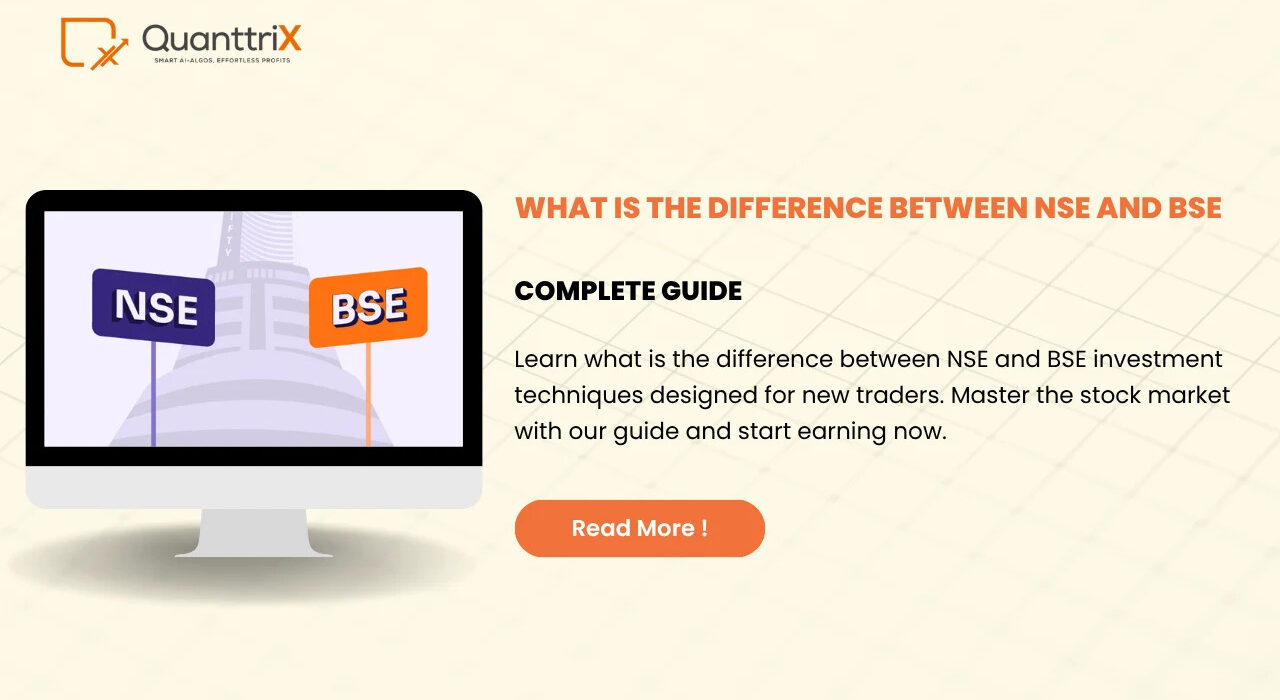Difference Between NSE and BSE: A Simple Guide for Everyone
Are you curious about the difference between NSE and BSE? You’re not alone! Whether you’re just entering the stock market or simply want to understand where and how people trade shares in India, knowing about these two is essential. Think of NSE and BSE as two bustling markets in the same city, each with its own charm and specialties. Have you ever wondered why there are two, and how they differ?
In this article, we’ll walk you through everything you need to know about the difference between NSE and BSE, what makes them unique, and how online trading software connects you to these financial hubs. Let’s make this easy and interesting—no confusing terms, just clear, friendly explanations!
Discover the difference between NSE and BSE, explore key features, and learn about online trading software for easy investing in India’s top stock exchanges.
Introduction to NSE and BSE
Before diving into the differences, let’s get a quick overview. NSE stands for National Stock Exchange, and BSE stands for Bombay Stock Exchange. Both are major stock exchanges in India where people buy and sell shares of companies.
Imagine NSE and BSE as two giant shopping malls—both offering a range of products (stocks) but differing in layout, crowd, and history. They are the pillars of the Indian stock market and play a vital role in the economy.
History: How NSE and BSE Began
BSE is the elder sibling, founded way back in 1875, making it Asia’s oldest stock exchange. It started as a small gathering of brokers in Mumbai.
NSE, on the other hand, is relatively young, established in 1992 to modernize and automate the Indian stock market. It introduced electronic, screen-based trading, replacing traditional open outcry methods.
Think of BSE as a grand old library and NSE as a brand-new tech-savvy coworking space.
Location and Physical Presence
Though both exchanges are headquartered in Mumbai, their reach varies. BSE has a network across around 450 cities, whereas NSE extends to over 1500 cities.
This bigger network allows NSE a broader participation from traders around India.
What Are Sensex and Nifty?
Ever heard these terms?
- Sensex is the benchmark index of BSE. It tracks 30 of India’s largest and most actively traded companies.
- Nifty 50 is NSE’s benchmark, covering 50 big companies.
Think of Sensex and Nifty as the temperature gauges for their markets—showing us how the market is performing.
Differences in Market Capitalization
Market capitalization is the total value of all companies listed on an exchange.
- BSE has around 5,400 trillion INR in market cap.
- NSE has about 5,130 trillion INR.
While BSE has more companies listed, NSE’s companies tend to have larger trading volumes.
Number and Types of Listed Companies
BSE lists around 7,400 companies, including many small and medium enterprises, giving it a wider but less liquid market.
NSE lists around 1,790 companies—fewer but generally larger and more actively traded.
Trading Technology and Speed
NSE was a pioneer in introducing fully automated electronic trading in India, making trade execution swift and transparent.
BSE also upgraded to electronic trading but traditionally was slower.
Imagine NSE as a fast express train and BSE as a reliable but slower local train.
Liquidity and Trading Volume
Liquidity means how easily shares can be bought or sold without affecting the price.
NSE enjoys higher liquidity with more active traders and larger volumes.
BSE, while liquid, tends to have lower volumes comparatively.
Products Available for Trading
Both exchanges offer trading in:
- Equities (stocks)
- Currency derivatives
- Mutual funds
- Bonds
NSE tends to lead in derivatives and futures trading.
Investor Base and Popularity
NSE attracts institutional investors and active traders due to its liquidity and technology.
BSE is often preferred by retail investors and those investing in smaller companies.
Role of Online Trading Software
With the rise of online trading software, buying and selling stocks on NSE and BSE has become accessible to everyone.
These platforms connect you directly to the exchanges, providing real-time quotes, charts, and efficient trading tools.
Think of online trading software as your personal key to the vast trading malls of NSE and BSE.
How to Choose Between NSE and BSE?
Wondering which to pick? It largely depends on what companies you want to trade and the liquidity you seek.
Many stocks are listed on both exchanges but have higher volumes on NSE.
If you prefer wider options with smaller companies, BSE could be your choice.
Advantages and Disadvantages
NSE Advantages: Faster trading, higher liquidity, advanced tech.
NSE Disadvantages: Fewer companies, more focus on large caps.
BSE Advantages: More companies, older reputation, diverse options.
BSE Disadvantages: Lower liquidity, slower trade execution.
Regulatory Bodies and Safety
Both exchanges are regulated by the Securities and Exchange Board of India (SEBI) ensuring safety, transparency, and fairness.
Your trades are secure whether you pick NSE or BSE.
Conclusion: Which One Suits You?
To sum it up, NSE is like an ultra-modern marketplace bustling with activity and speed, while BSE is the historic and expansive market offering variety.
Your choice depends on your trading needs and preferences.
Exploring both can offer valuable insights and trading opportunities.
Frequently Asked Questions (FAQs)
Q1: Can I trade the same stock on both NSE and BSE?
A1: Yes, many companies are listed on both, but NSE usually has higher liquidity.
Q2: Which exchange has a higher number of listed companies?
A2: BSE has a larger number of listed companies compared to NSE.
Q3: What is the role of online trading software?
A3: It allows you to trade stocks easily on NSE and BSE using digital platforms with real-time updates.
Q4: Are both NSE and BSE regulated by the same authority?
A4: Yes, both are regulated by SEBI for investor protection and transparency.
Q5: What benchmarks represent NSE and BSE?
A5: NSE’s benchmark is Nifty 50, and BSE’s benchmark is Sensex.





